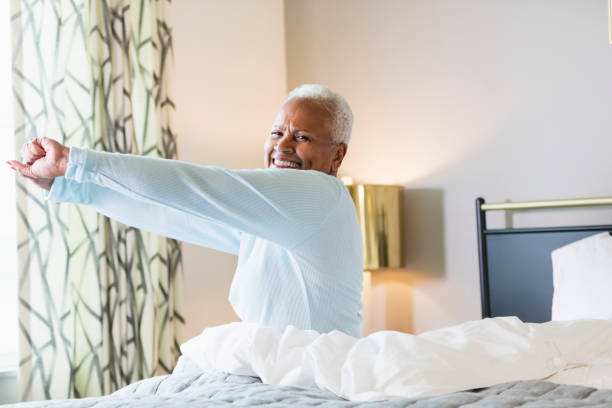Better Sleep For Seniors

Sleep hygiene refers to habits and practices that contribute to the quality and duration of sleep. For senior adults, maintaining good sleep hygiene is crucial, as aging often changes sleep patterns, including shorter sleep durations, frequent awakenings, and a decrease in deep sleep stages. Here are some tips for better sleep hygiene tailored specifically for senior adults.
1. Establish a Consistent Sleep Schedule
Maintaining a regular sleep schedule is one of the most effective strategies for improving sleep quality. Going to bed and waking up at the same time every day, including weekends, helps regulate the body’s internal clock, known as the circadian rhythm.
For seniors who may experience shifts in their circadian rhythm, adhering to a consistent schedule can help minimize sleep disturbances.
2. Create a Relaxing Bedtime Routine
A relaxing bedtime routine signals the body that it is time to wind down and prepare for sleep. This routine can include reading a book, listening to calming music, practicing gentle yoga or meditation, or taking a warm bath.
These activities can reduce stress and anxiety, which are common sleep disruptors among older adults. It’s important to avoid stimulating activities, such as watching TV or using electronic devices, as the blue light emitted can interfere with the production of melatonin, the hormone that regulates sleep.
3. Optimize the Sleep Environment
The sleep environment plays a significant role in the quality of sleep. For seniors, ensuring the bedroom is conducive to sleep is essential. This can be achieved by:
- Keeping the room dark and quiet: Light exposure can disrupt sleep, so use blackout curtains or an eye mask. Earplugs or a white noise machine can help if noise is an issue.
- Maintaining a comfortable temperature: The room should be cool but not too cold, as a comfortable temperature promotes better sleep.
- Investing in a good mattress and pillows: A supportive mattress and comfortable pillows that suit an individual’s preferences can reduce discomfort and improve sleep quality.
4. Manage Light Exposure
Exposure to natural light during the day is important for regulating the circadian rhythm. Seniors should try to spend time outdoors in natural sunlight, especially in the morning, as this helps reinforce the sleep-wake cycle.
Conversely, limiting exposure to bright lights in the evening can help the body prepare for sleep. Using dim lights in the evening and avoiding screens close to bedtime can further support melatonin production.
5. Be Mindful of Diet and Hydration
What seniors eat and drink, particularly in the hours leading up to bedtime, can impact sleep quality. To promote better sleep:
- Avoid heavy meals before bedtime: Eating a large or heavy meal close to bedtime can cause discomfort and indigestion, which may interfere with sleep. Seniors should aim to have their last meal at least two to three hours before going to bed.
- Limit caffeine and nicotine: Both caffeine and nicotine are stimulants that can interfere with sleep. It’s best to avoid these substances in the afternoon and evening.
- Monitor alcohol intake: While alcohol may make one feel sleepy initially, it can disrupt sleep later in the night. Seniors should consume alcohol in moderation and avoid it close to bedtime.
- Stay hydrated, but not too close to bedtime: Dehydration can cause discomfort during the night, but drinking too much liquid before bed can lead to frequent trips to the bathroom, disrupting sleep. Seniors should aim to drink plenty of water during the day and limit fluids in the evening.
6. Exercise Regularly
Regular physical activity has numerous benefits, including improved sleep quality. Exercise helps reduce stress, anxiety, and depression, which are common contributors to sleep problems in older adults. Seniors should aim for at least 30 minutes of moderate exercise most days of the week.
Activities such as walking, swimming, or gentle yoga can be particularly beneficial. However, avoiding vigorous exercise close to bedtime is important, as it can be stimulating and make it harder to fall asleep.
7. Limit Naps
While napping can be beneficial, especially if sleep is interrupted at night, long or late naps can interfere with nighttime sleep. Seniors should limit naps to 20-30 minutes and avoid napping in the late afternoon or evening. If daytime fatigue is a problem, focusing on improving nighttime sleep may be better than relying on naps.

8. Manage Stress and Anxiety
Stress and anxiety are common among older adults and can significantly impact sleep quality. Developing effective stress management techniques is crucial for better sleep hygiene. Seniors can try:
- Mindfulness meditation: Practicing mindfulness can help calm the mind and reduce anxiety, making it easier to fall asleep.
- Progressive muscle relaxation: This technique involves tensing and then relaxing different muscle groups, which can help reduce physical tension and promote relaxation.
- Journaling: Writing down worries or concerns before bed can help clear the mind and prevent racing thoughts that can keep one awake.
9. Consider Cognitive Behavioral Therapy for Insomnia (CBT-I)
Cognitive Behavioral Therapy for Insomnia (CBT-I) is a highly effective, non-pharmacological treatment for insomnia. It helps individuals identify and change thoughts and behaviors that contribute to sleep problems.
CBT-I can be particularly beneficial for seniors who have developed negative associations with sleep or who have chronic insomnia. This therapy is often available through a trained therapist and can be done in person or through online programs.
10. Limit the Use of Sleep Medications
While sleep medications can be helpful in the short term, they are generally not recommended for long-term use, especially in older adults. These medications can have side effects, including daytime drowsiness, confusion, and an increased risk of falls.
Instead, seniors should focus on improving sleep hygiene and consider non-pharmacological treatments, such as CBT-I, if sleep problems persist.
11. Address Underlying Health Issues
Chronic health conditions, such as arthritis, diabetes, heart disease, and sleep apnea, can interfere with sleep. Seniors need to work with their healthcare providers to manage these conditions effectively.
In some cases, treating the underlying health issue can significantly improve sleep quality. For example, using a continuous positive airway pressure (CPAP) machine can help those with sleep apnea get better rest.
12. Review Medications with a Healthcare Provider
Some medications, including those for high blood pressure, asthma, and depression, can cause sleep disturbances. Seniors should review their medications with a healthcare provider to determine if any adjustments are needed. In some cases, switching to a different medication or changing the timing of a dose can help improve sleep.
13. Stay Socially Engaged
Social isolation can contribute to depression and anxiety, both of which can interfere with sleep. Seniors should strive to stay socially engaged through activities such as joining clubs, volunteering, or maintaining regular contact with friends and family. Social interaction can provide a sense of purpose and belonging, positively impacting sleep.
14. Limit Screen Time Before Bed
The use of electronic devices, such as smartphones, tablets, and computers, before bed can interfere with sleep. The blue light emitted by these devices can suppress melatonin production and make it harder to fall asleep. Seniors should aim to turn off electronic devices at least an hour before bedtime and engage in relaxing activities instead.
15. Seek Help for Sleep Problems
If sleep problems persist despite making these changes, seniors need to seek help from a healthcare provider. Sleep issues can be a sign of an underlying condition that needs to be addressed. A healthcare provider can help determine the cause of sleep problems and recommend appropriate treatments.
Conclusion
Good sleep hygiene is essential for senior adults to maintain their health, cognitive function, and overall quality of life. By adopting these tips and prioritizing sleep, seniors can improve their sleep quality and enjoy more restful nights.
It’s important to remember that sleep needs and patterns can change with age, so finding the right routine and strategies that work best may take some time. With persistence and the right approach, better sleep is within reach for senior adults.
